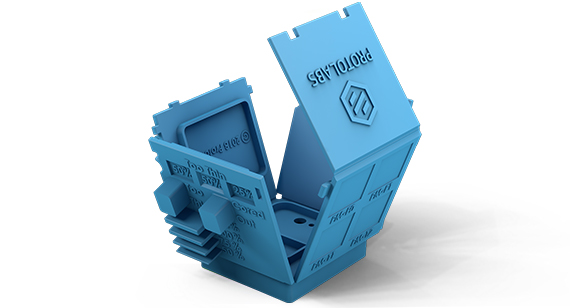PET Injection Molding
PET or polyester is a semi-crystalline resin that provides a natural high gloss finish, dimensional stability, and UV resistance

We offer two grades of PET at Protolabs:
- Rynite 530 (30% Glass Filled)
- Rynite 935 (35% Glass Filled)
Both grades are similar in that they are UV-resistant polymers with a well-rounded thermal, mechanical, and chemical properties. The thermoplastic material is well-suited for electrical applications. Rynite also flows well into the mold so it can more easily fill thin walls and complex features.
Key benefits of PET:
- Dimensional stability
- UV resistance
- Lightweight
- Durable
- Natural high-gloss surface finish
- Stiffness
Injection Molding PET Material Properties
| Tensile Modulus |
Tensile Stress (Break) |
Flexural Modulus | Rockwell Hardness (R-Scale) |
Melting Point | Data Sheet | |
|---|---|---|---|---|---|---|
| Test Method | ISO 527 | ISO 527 | ISO 178 | ISO 20390 | ISO 11357 | |
| Rynite 530 (30% Glass Filled) | 11,000 MPa | 158 MPa | 8,950 MPa | 120 | 252°C | VIEW PDF |
| Rynite 935 (35% Glass Filled) | 10,200 MPa | 85.0 MPa | 9,100 MPa | 115 | 252°C | VIEW PDF |
Grab a Design Cube
Want to learn more about injection molding? Sign up to receive a Design Cube. This physical aid demonstrates how to properly design features commonly found on molded parts.


PET Injection Molding Applications
The material properties of Rynite PET make it an ideal options for components in electrical applications, consumer products, and automotive.
PET is often used for the following parts:
- Plastic components in electrical products
- Electrical encapsulation or insulation
- Electrical insulation polymers
- Connectors for electrical
- Packaging or containers for consumables and food
- Appliances









